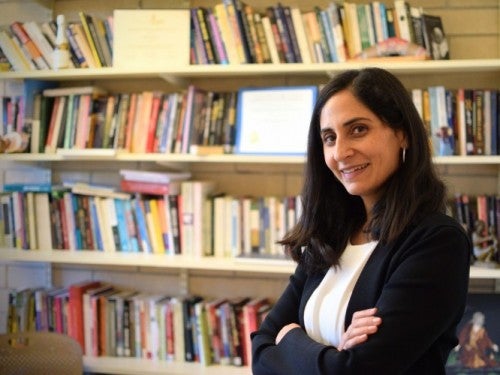Meet Pardis Mahdavi, the Korbel School's New Acting Dean
Pardis Mahdavi, PhD, is Chief Academic Officer and Senior Associate Dean of the Josef Korbel School of International Studies. While at Pomona College from 2006-2017, she served as professor and chair of anthropology, director of the Pacific Basin Institute and Dean of Women. Her research interests include academic freedom, diversity and inclusion in higher education, gendered labor, human trafficking, migration, sexuality, human rights, youth culture, transnational feminism and public health in the context of changing global and political structures.
Q: You earned an interdisciplinary PhD in sociomedical sciences and anthropology from Columbia University. What are your thoughts on interdisciplinary research at Korbel?
A: At Korbel, we understand those studying the most pressing issues of our time — human trafficking, climate change, global economic inequities, violence, and nonviolent resistance – must have interdisciplinary training. We embody interdisciplinarity in everything we do at Korbel, from curriculum to faculty research.
Q: As acting dean, you’ll help Korbel to craft its strategic plan. How do you plan to approach this project? How do you envision Korbel’s strategic plan will connect to DU IMPACT 2025?
A: The strategic planning process is well underway, and we’re working to be closely aligned with DU IMPACT 2025. We’ve created task forces and are working with students, faculty, staff, community members, board members, stakeholders and others to create an expansive, inclusive plan. I’m excited by the direction of the strategic plan and look forward to sharing it with our university community once it’s ready.
Q: Academic freedom is one of your research interests. What are your thoughts on the status of academic freedom and how it could impact Korbel and DU?
A: While academic freedom is incredibly important, too often it has been falsely weaponized against inclusivity. I’m uncomfortable with setting up a dichotomy between academic freedom and diversity. Many campus clashes are more about what it means to be a student and who gets to define the student experience than academic freedom or diversity. It’s important we understand the core issues so we can build more robust responses.
Q: You came to DU from Pomona College, an institution with a highly diverse student body. How do you plan to promote diversity at Korbel?
A: Diversity and inclusive excellence are central core values of mine, and they’re among the main reasons I went into administration. My life’s mission is to build higher education toward inclusivity, interdisciplinarity, and intersectionality. We’re crafting a strategic plan for Korbel in which both diversity and inclusive excellence are centerpieces. We plan to change our hiring, recruiting and evaluation metrics with diversity and inclusive excellence in mind. We’re also discussing inclusive and intersectional pedagogies.








